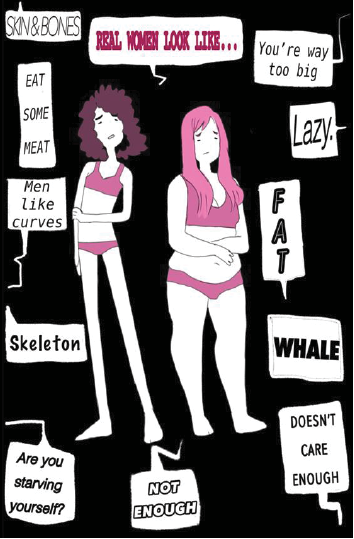Body shaming affects everyone, still largely ignored by public
December 14, 2018
Everybody has insecurities. Whether it be based on weight, height, shape or countless other things, people just can’t seem to accept their appearance for what it is. Even though it’s clear there’s a problem with our self image, little has been done to solve it.
Recently, the rise of social media has fueled the fire of body shaming to exponential levels.
Adding insecurity, social media and anonymity together creates a dangerous mixture of online harassment. People, uncomfortable with themselves, often target their feelings of hurt onto somebody else to feel better.
According to a Yahoo Health survey done in 2016, people who have been body shamed in the past are 32 percent more likely to shame others.
The survey also reported that 92.7 percent of women claimed to have been body shamed, yet society somehow hasn’t cracked the code as to why we’re not comfortable in our own skin.
Going outside or online, it’s hard to miss the reason.
Billboards feature bright and shiny models, expertly crafted in Photoshop.
Instagram pages are filled with celebrities’ surgeon-built butts and chiseled abs, always feigning being natural. While these posts are free for impressionable minds to see, the workout routines or pills that will supposedly create the ideal body will cost, regardless of effectiveness.
It’s easy for people to harbor jealousy when they’re bombarded with flawless figures pushing products that subtly tell us we aren’t worthy the way we’re born. These human advertisements are paid for targeting the easily influenced, making a market out of body shaming.
What little has been done to try and counteract body shaming culture in our country has barely made a dent, even if their hearts are in the right place. Movements encouraging body positivity often use a one-size-fits-all approach to making people feel better. Plastering vague words of encouragement everywhere doesn’t help those who already think they’re unattractive.
They usually only show ideal body types in various sizes. The hidden message is it’s okay to be fat, as long that fat is located in the right spots, as long as your skin isn’t blemished or stretched. It’s okay to be thin if you aren’t bony and still have curves. If the perfect hourglass shape is still there, one is still considered beautiful. But these molds don’t fit everybody. People aren’t perfectly polished dolls.
Thin women in particular are frequently put down, but are told that they aren’t allowed to be hurt because they’re skinny. A limit can’t be put on how people feel when these girls are bullied just as much as anybody else.
It isn’t an issue of which body type deserves more sympathy. This affects everybody. We’ve all felt like we aren’t enough. It’s so common that we just accept it as a normal part of our culture.
This needs to change. The best place to start is to learn to love ourselves and spread that to the people around us. Change will be slow, but one day we could live in a diverse society that accepts humans in all shapes and sizes.

